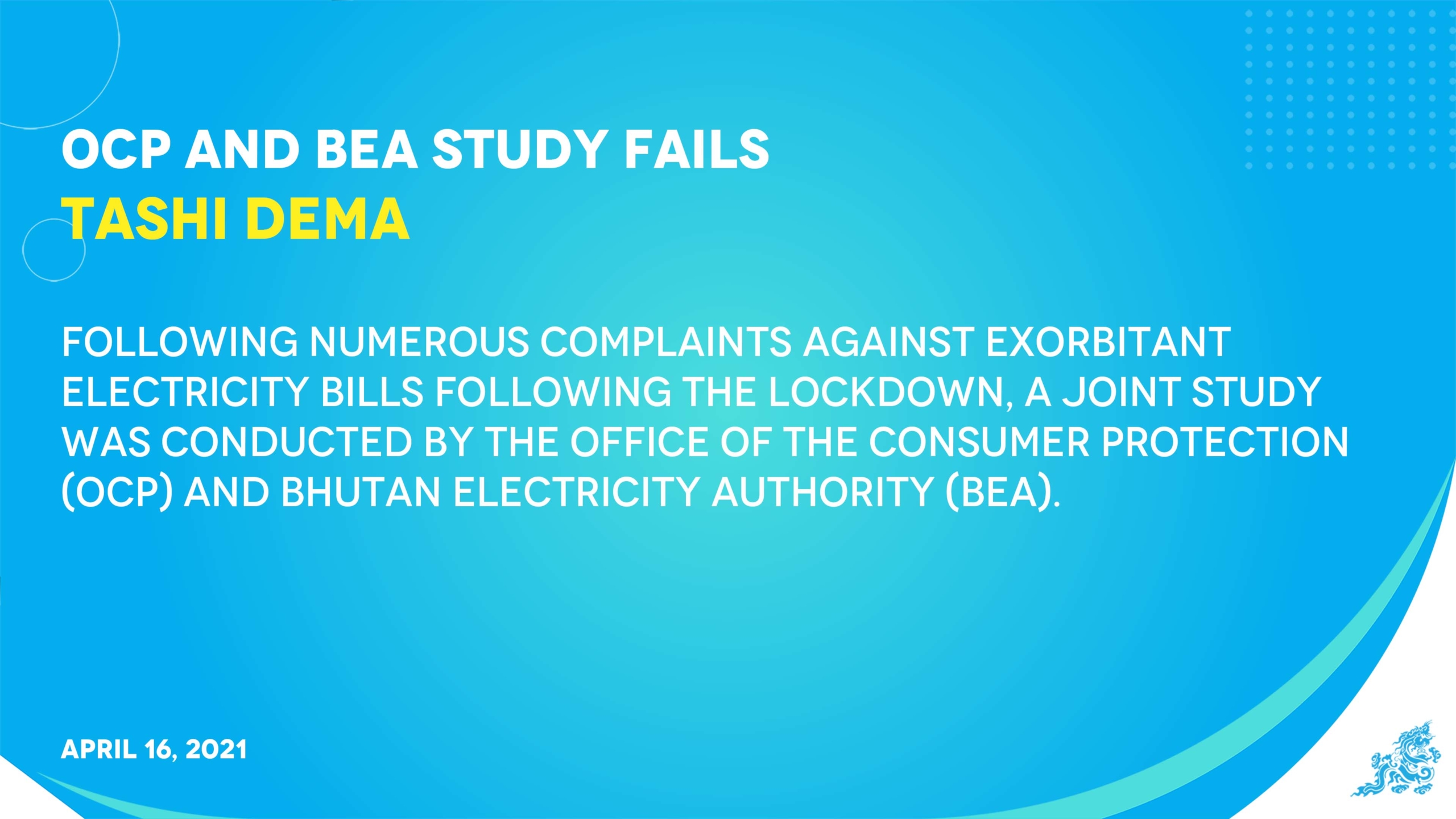
BPC asked to reassess tariff application
Tashi Dema
Nearly 7,960 consumers out of 46,456 consumers in Thimphu received more than 100 percent increase in energy consumption in January and February this year compared with the same months of 2020, according to a joint study Office of the Consumer Protection (OCP) and Bhutan Electricity Authority (BEA) conducted recently.
Following numerous complaints against the exorbitant electricity bills, the study found that 15 percent of the active 46,456 consumers in Thimphu received 100 percent increase in electricity consumption bill than the same months of last year.
In the report, uploaded on the economic affairs ministry’s website, OCP opined that irregularities in meter reading based on the monthly billing cycle may have contributed to the high bill. “It was noted that consumers were imposed penalties for January and February 2021 by BPC despite their own notification issued to waive off penalties.”
The report stated that the application of average method and adjustment in lockdown 1.0 had a cascading effect during lockdown 2.0 as the average of October, November and December months of 2020, computed for January 2021, was much lower than the actual consumption.
“However, when the consumers were billed on actual reading for February 2021, the amount was relatively higher resulting in several complaints from consumers,” it stated. “Therefore, BPC, after adjusting the energy charges and eligible energy subsidies, reissued the bills for these two months by taking the average bills of January and February 2021.”
The report stated that the average billing method implemented for the months of August and September 2020 has led to loss of block tariff benefits or subsidy in the subsequent months of October and November 2020. “The subsidy foregone were not adjusted by BPC through normalisation of the bills.”
It also found some instances where the energy consumption unit was reflected relatively low or zero consumption in some months although actual consumption was higher. “Such cases could have resulted in forgoing subsidy benefits and charging high in subsequent months.”
One finding was that the average bill for first lockdown was supposedly more than the actual billing. It claimed that BPC adjusted the excess amount in the months of October and November 2020 in some cases.
The report stated that during field visit, it was observed that BPC calibrated the meter as well as carried out meter reading, which may be conflicting as BPC was also the bill collector.
“Further, it was noted that there was no system in place to ensure correct reading of the meter as stipulated in the billing cycle schedule,” it stated. “The current set up indicates flexibility to the meter readers whereby they had the discretion to visit the consumer premise irrespective of the billing schedule. As such, consumers could have been deprived of the block tariff benefits.”
The study found out that upon inquiry with consumers, majority of the consumers were not made aware of the implementation of the average billing methodology that BPC adopted, thus, creating apprehensions among the public.
The 20-page report recommended some interventions and asked BPC to submit a compliance report.
Reassessing the tariff application
BPC was directed to reassess the block tariff application and provide forgone subsidy benefits to all affected consumers across the country for the lockdown 1.0, waive off the late payment penalties, and facilitate part payment till June 2021.
“In addition, a set of remedial actions to strengthen existing standard operating procedures for metering and billing and consumer grievance redressal mechanisms were provided to avoid recurrence of such issues,” the report stated.
However, many consumers were not happy with the report, which they said was based more on assumptions.
A Thimphu resident, an electrical engineer by profession, said she was happy when she learnt BEA and OCP was conducting the study, as she expected the report would provide details on how BPC issued the high electricity bills. “But when I went through the report, the sample specimen was too small and it did not provide the true picture.”
She also said BEA and OCP diluted the issue.
Another electrical engineer said the report was not based on evidence and that it could have been more comprehensive.
He said that of the 46,456 consumers in Thimphu, the report contains samples of only two users, which was too less. “Two samples out of 100 are also too less.”
He alleged that OCP and BEA did not exercise due diligence in studying the issue but just filed a report. “If 7,960 consumers receive a 100 percent increase in electricity consumption, something is seriously wrong in the billing system. This is not a minor issue as they portray.”
He said OCP and BEA are supporting BPC, who is robbing people during the difficult time.
The engineer was also not convinced with the study methodology or formula the two offices used, saying it was inconsistent. “The report stated they conducted trend analysis of energy consumption for the past three years but it did not show the trend of the three years anywhere.”
A consumer refused to believe BPC adjusted the overbilling of the first lockdown with October and November. “If they really did, they should have informed us. With no accountability fixed, BPC officials will never address the issue.
Meanwhile, consumers also questioned the average billing methodology and questioned if the board has the authority to approve it.
A consumer said BEA is the regulating authority and the guardian of the Electricity Act and should have been consulted on the average billing system BPC adopted.
Another questioned how BPC could make consumers pay for the average billing when they are also issued the bill on actual meter reading. “If they could issue bills on actual meter reading, why the average billing.”
Kuensel learnt BPC transferred or suspended few meter readers but could not avail of the details.

